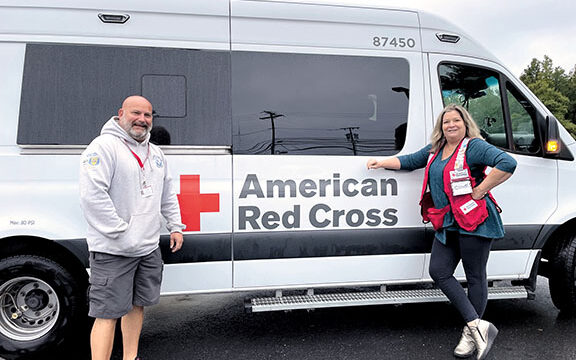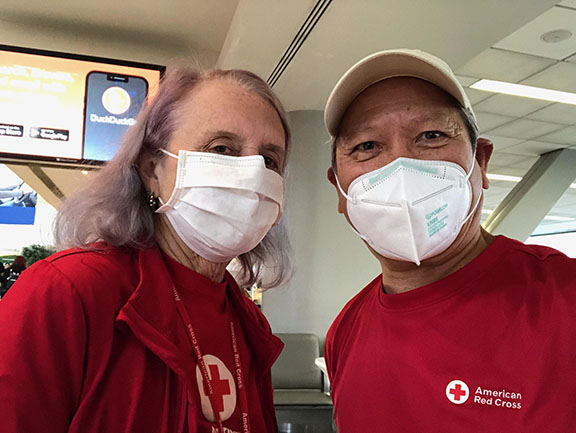
By Eileen Moon
When scary things happen in life, the creator of the beloved children’s television show, “Mister Rogers’ Neighborhood,” once advised, look for the helpers. There are always helpers, Fred Rogers told his listeners young and old.
And when Hurricane Ian struck the Gulf Coast of Florida with a blow that wiped out hundreds of neighborhoods Sept. 28, the helpers came running.
Among them were 32 volunteers from the New Jersey Region of the American Red Cross, including five volunteers from Monmouth County who deployed to the scene to aid in providing food and shelter for survivors who, in many cases, had lost everything they owned in the span of a few hours.
Three days after the storm, Monmouth County Red Cross volunteers Gary Olivero, Mary Sterling, Maria Martinez, Cynthia D’Onofrio and Juan Caez deployed, heading south to join thousands of their fellow volunteers from the Red Cross and many other disaster response organizations in helping those impacted by Hurricane Ian to take the first, difficult steps toward recovery.
It is an experience that Holmdel resident Gary Olivero knows well. A Red Cross volunteer for 17 years, Olivero, 73, lost his home in Sea Bright during Super Storm Sandy.
Accustomed to being the one providing aid, seeing the Red Cross truck pull into his driveway in 2012 was an affecting and somewhat surreal experience, Olivero said.
As a logistics expert whose disaster work involves coordinating with county and state emergency operations as well as partner organizations like Catholic Charities, the Salvation Army and many other faith-based and nonprofit groups, Olivero said he hadn’t fully realized how personally empowering it can be for a disaster survivor to receive the smallest gesture of support.
When the Red Cross volunteers presented Olivero and his wife with a simple cleanup kit after Sandy, he remembered it brought his wife to the verge of tears, giving her the first glimmer of hope that recovery was possible.
That firsthand experience broadened his understanding of the importance of the Red Cross mission to provide not only food and shelter but understanding and empathy as well.
In the immediate aftermath of Hurricane Ian, more than 30,000 Floridians took refuge in the 11 shelters staffed by the Red Cross and its partners, said Diane Concannon, communications director for the American Red Cross New Jersey.
By Sunday, Oct. 9, the number of people in emergency shelters had dropped to 1,600 as survivors either returned home or found temporary shelter elsewhere.
But as a veteran of many disasters, Olivero noted, the shelter numbers are anticipated to rise again as survivors come to terms with the reality that for many, there will be no going back home.
“Many neighborhoods that were home to retirees on fixed incomes and mobile home parks have been left unrecognizable,” Concannon said. “Many of our shelter residents are about 70 years of age or older, many have complex health challenges and disabilities, and they have lost everything they owned because of Hurricane Ian.”
Red Cross volunteers from the Tinton Falls office drove down in Red Cross Emergency Response and Mission Response vehicles that are critical to providing help to those stranded by the storm.
“More than 120 Red Cross emergency response vehicles are on the roads delivering hot meals and relief supplies to people struggling in the hardest hit areas,” Concannon said.
In the days since the storm, volunteers with the nonprofit organization Southern Baptist Disaster Relief have been preparing meals for thousands of disaster survivors.
Last Sunday alone, Concannon said, Southern Baptist kitchens turned out more than 146,000 meals.
In addition to shelter and food, the Red Cross is also providing mental health and medical support to families experiencing what may be the most difficult challenges of their lives.
To be able to mobilize quickly, Red Cross volunteers spend many hours training for their roles during periods of time they refer to as “blue sky,” Olivero said. He decided to volunteer in 2005, after Hurricane Katrina wreaked havoc in Louisiana and its sister states in the south. Transitioning from a corporate career to his own business, Olivero was ready for a fresh challenge and wanted to help.
By the time he was fully trained, however, the need for Katrina volunteers had diminished. But there were many disasters to come in which his skills were needed.
“I volunteered with very little understanding of what it really involved,” he said.
As an international nonprofit, volunteers for the Red Cross must have a strong understanding of the mission and the skills to fulfill it. From the basics of “what we do and why we do it,” volunteers continually train in the practical skills necessary to be ready for deployment on very short notice, Olivero said. “(You learn) how to handle shelter, how to handle food,” he said. “There are a lot of rules as far as health and safety, training for driving vehicles, disaster services training. After that, you dive into your specialty.”
Red Cross volunteers come from all walks of life and can apply skill sets from many fields to the work of disaster recovery.
“Volunteering for the Red Cross can really be sliced and diced to the interests of the individual,” Olivero said.
Once fully trained, volunteers deploy to the disaster area for two-week stints. “There will be a second and third wave (of volunteers),” Olivero said. “We will stay down there for a long as we’re needed.”
Accommodations are basic and hours are long. “You are not staying in a fancy hotel or anything like that,” Concannon noted.
“I got lucky this time,” Oliver joked. “I’m bunked up with just eight guys instead of 24. You bring your sleep mask and your earplugs and you’re so tired, you just go to sleep.”
But the rewards of the work are rich compensation for any hardships the deployments require.
“I was as Boy Scout,” Olivero said. “And the Boy Scout motto was to be prepared and to do a good turn daily. I really think the Red Cross captures that. It makes me feel fulfilled.”
If you would like to volunteer with the Red Cross, visit redcross.org and click on the volunteer section. To help people affected by Hurricane Ian, visit redcross.org, call 1-800-REDCROSS, or text the word IAN to 90999 to make a $10 donation.
The article originally appeared in the October 13 – 19, 2022 print edition of The Two River Times.















